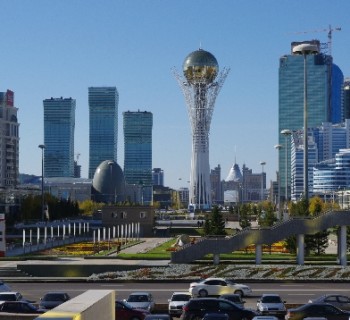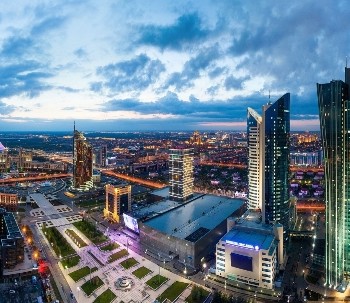Coat of arms of Astana
Of all the former Soviet republics located in the Asian part of the USSR, only Kazakhstan has achieved significant success, and is currently flourishing. This happened largely thanks to the country's President Nursultan Nazarbayev. By the way, an interesting fact, the coat of arms of Astana also appeared with his help, he is the author of the concept of the heraldic symbol of the capital.
Description of the capital's coat of arms
To appreciate the aesthetics of the main symbol of the Kazakh capital, it is imperative to consider a color photo. This is the only way to evaluate the coloristic palette of the image, in which only three colors are used - blue, scarlet and gold, but they look very harmonious.
To depict the coat of arms of Astana, a circle was chosen as the basis, symbolizing the infinity of life, respect for the traditions of the past and confidence in the future. The main elements of the main capital symbol: an outer ring reminiscent of the great Kazakh steppe; an inner ring containing symbols of the country's independence. The rings differ in color and detail, the outer is scarlet, which is associated with endless steppes and sands. The red color among Kazakhs also correlates with fire, the hearth of their home. The outer ring is defined as Shanyrak, this is the return home.
The interior space is painted blue, matching the tone of the national flag. In addition, Baiterek appears here, which is called the world tree, a kind of personification of the universe. It is a symbol of development, life, connection with space..
Excursion into Kazakh history
It is known that Kazakhstan began its post-Soviet history with the transfer of the capital. The city, to which the government of the country and many institutions moved, has more than one century. It changed its name and status several times..
In the 19th century, it was called Akmolinsk, did not have its own coat of arms, but used the heraldic symbol of the Akmola region, approved in 1878. In the center of the green shield was a silvery monument resembling a castle or fortress, and above it was an image of a crescent. The shield was decorated with a royal crown and a wreath of oak leaves.
In Soviet times, the city was renamed Tselinograd, respectively, the royal coat of arms could not be used in any way. A new symbol appeared - two hands that hold grain, since at that time there was an active development of the Kazakh virgin land.
Since 1998, with the beginning of the independent life of the state, for ten years, the coat of arms was used, the central image of which was a white leopard, crowned with a khan's crown.


